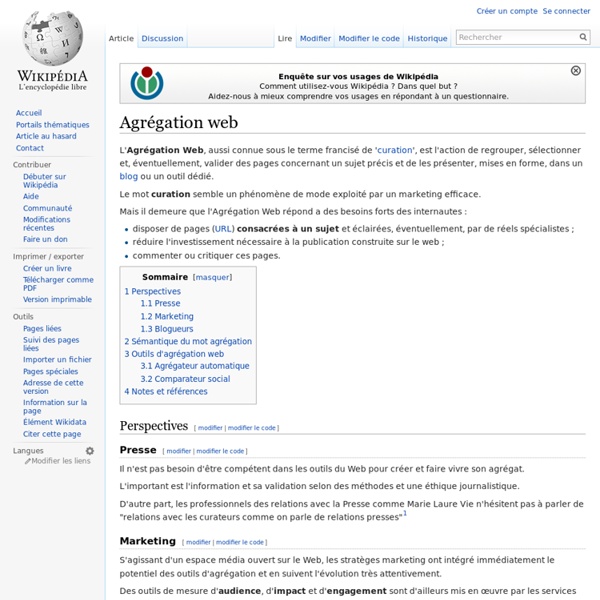Storify
Storify is a social network service that lets the user create stories or timelines using social media such as Twitter, Facebook and Instagram. Storify was launched in September 2010, and has been open to the public since April 2011. Use[edit] Users search through multiple social networks from one place, and then drag individual elements into stories. Users can re-order the elements and also add text to help give context to the readers. Media organizations have used Storify in coverage of ongoing news stories such as elections[6] and meetings and events.[7] Poynter.org recommended using Storify for covering social movements, breaking news, internet humor and memes, reactions and conversations, and extreme weather.[8] CBC used Storify to cover the 2011 London riots,[9] TRT World used Storify to cover the UK general election 2015 and Al Jazeera has a show called "The Stream" that collects perspectives on news stories using Storify.[10][11] Features[edit] History[edit] Traffic information[edit]
Web scraping
Un article de Wikipédia, l'encyclopédie libre. Le web scraping (parfois appelé harvesting) est une technique d'extraction du contenu de sites Web, via un script ou un programme, dans le but de le transformer pour permettre son utilisation dans un autre contexte comme l'enrichissement de bases de données, le référencement[1] ou l'exploration de données. Légalité[modifier | modifier le code] Aux États-Unis[modifier | modifier le code] Aux États-Unis, la société hiQ Labs utilise le web scraping sur les données de LinkedIn à des fins de recrutement. En Europe[modifier | modifier le code] Dans un jugement de 2013, la cour de justice de l'Union européenne a condamné le métamoteur de recherche Innoweb, qui réutilisait les données de l'entreprise de vente d'automobiles Wegener sans aucune modification de celles-ci[5]. En France[modifier | modifier le code] En décembre 2021, une start-up de la Station F est condamnée pour piratage informatique. Technologies[modifier | modifier le code]
Social network aggregation
Social network aggregation is the process of collecting content from multiple social network services, such as MySpace or Facebook, into one unified presentation. The task is often performed by a social network aggregator, which pulls together information into a single location,[1] or helps a user consolidate multiple social networking profiles into one profile.[2] Various aggregation services provide tools or widgets to allow users to consolidate messages, track friends, combine bookmarks, search across multiple social networking sites, read RSS feeds for multiple social networks, see when their name is mentioned on various sites, access their profiles from a single interface, provide "lifestreams", etc.[2] Social network aggregation services attempt to organize or simplify a user's social networking experience,[3] although the idea has been satirized by the concept of a "social network aggregator."[4] Social network aggregators[edit]
Agrégateur
Un article de Wikipédia, l'encyclopédie libre. En informatique, un logiciel d'agrégateur tresse plusieurs fils de syndication en même temps. Il prévient de la mise à jour d'un site web ou des actualités qu'il publie (par notification sonore, visuelle, etc.). Également, il importe le contenu nouveau en question et il le fait pour un ensemble de sites. Le terme est aussi utilisé de manière plus générale pour une activité tendant à regrouper plusieurs grandeurs ou flux en un seul, telle que l'agrégation d'effacement de consommation électrique. Description[modifier | modifier le code] L'agrégateur est une sorte de « facteur » qui va chercher le courrier à l'extérieur, puis le dépose chez l'utilisateur, dispensant ce dernier d'aller régulièrement aux nouvelles en visitant de nombreux sites internet. Les sources de contenu (des sites web en général) offrent l'adresse d'un fil de syndication mis à jour plus ou moins régulièrement. Technologie[modifier | modifier le code]
Social media measurement
Social media measurement or ‘social media monitoring’ is an active monitoring of social media channels for information about a company or organization,[1] usually tracking of various social media content such as blogs, wikis, news sites, micro-blogs such as Twitter, social networking sites, video/photo sharing websites, forums, message boards, blogs and user-generated content in general as a way to determine the volume and sentiment of online conversation about a brand or topic. Social media monitoring allows users to find insights into a brand's overall visibility on social media, measure the impact of campaigns, identify opportunities for engagement, assess competitor activity and share of voice, and be alerted to impending crises. It can also provide valuable information about emerging trends and what consumers and clients think about specific topics, brands or products. Quantifying social media[edit] It can be difficult to measure all social media conversation. See also[edit]
lynkly - the world's news feed
Social media marketing
Social media marketing is the process of gaining website traffic or attention through social media sites.[1] Social media marketing programs usually center on efforts to create content that attracts attention and encourages readers to share it across their social networks. The resulting electronic word of mouth (eWoM) refers to any statement consumers share via the Internet (e.g., web sites, social networks, instant messages, news feeds) about an event, product, service, brand or company.[2] When the underlying message spreads from user to user and presumably resonates because it appears to come from a trusted, third-party source, as opposed to the brand or company itself,[3] this form of marketing results in earned media rather than paid media.[4] Social media platforms[edit] Social networking websites[edit] Social networking websites allow individuals to interact with one another and build relationships. Social networking sites act as word of mouth. Mobile phones[edit] Strategies[edit] 1.
Mixx - Latest news and top videos and photos from around the web



